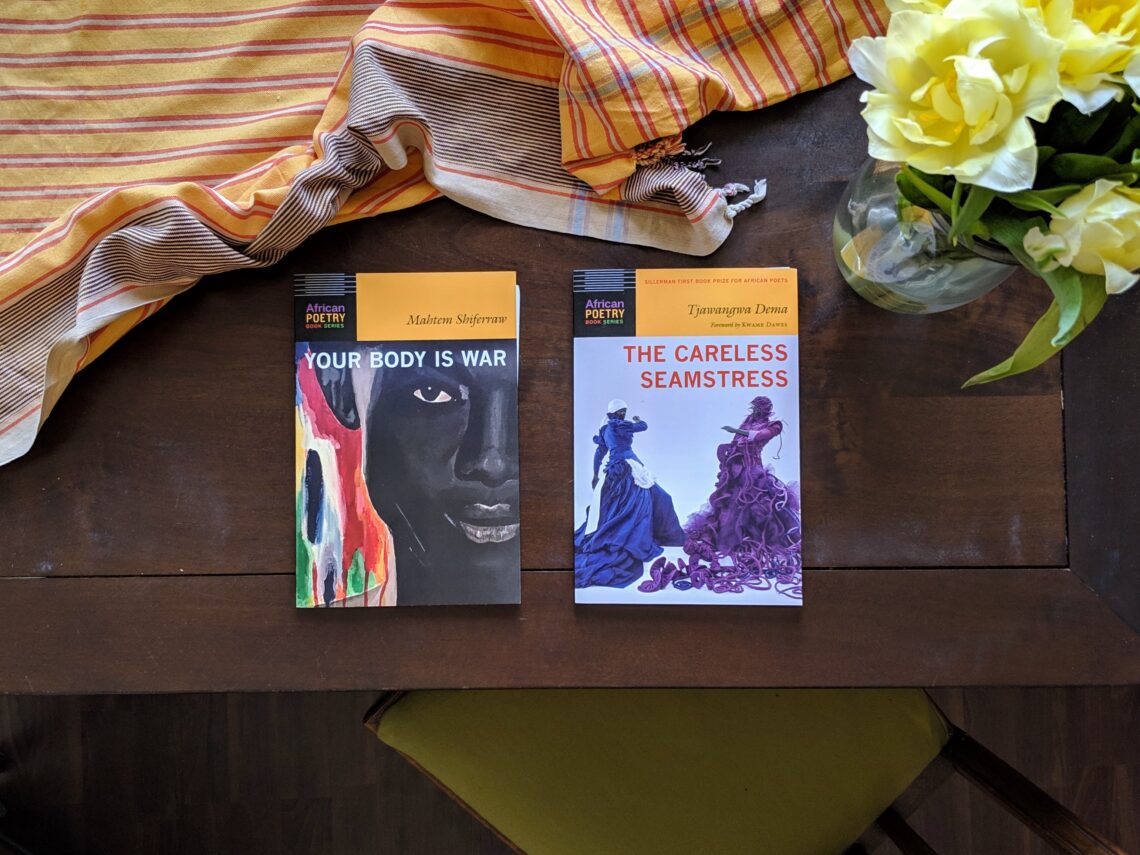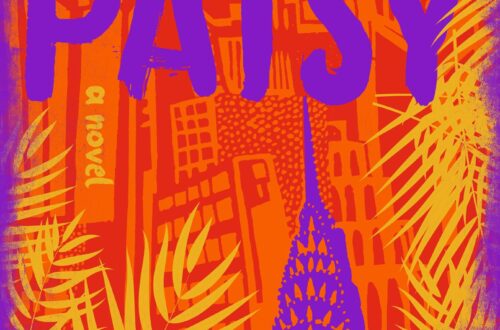
“All the ghosts of life/ assemble before us”
This March started with a bang for poetry. On the first day of the month, University Press of Nebraska published Tjawangwa Dema’s debut collection The Careless Seamstress and Mahtem Shiferraw’s sophomore collection Your Body is War as part of the African Poetry Book Series. Both poets are deeply invested in interrogating the ways women experience this world and crafting a specific language and imagery to capture these experiences.
Tjawangwa Dema’s chapbook Mandible had been included in the box set Seven New Generation African Poets five years ago – other poets of that group like Warsan Shire, Nick Makoha, and Ladan Osman have also gone on to publish celebrated works since. Now it is Dema’s turn and she has a lot to offer as well. No one less than U.S. poet laureate Tracy K. Smith praises her poems as “delicate and incisive”. While I had read Mandible back when it was published, her new collection really caught my eye when its cover was revealed. It shows a striking piece by South African visual artist Mary Sibande. Sibande’s work, which often dissects stereotypes around Black women, is very much interested in textiles. In an interview, she once spoke about her sculpture “Mechanism” and said: “[T]he work was a larger than life presser foot and needle of a sewing machine. The work was paying homage to one of my greatest tools that I use to make my work.” Sewing and textiles, often seen as frivolous (because it is associated with women) or underappreciated labour (because it is associated with women), are reoccurring themes in Dema’s poetry and offer a wide array of metaphors from the opening poem “The Elegy of a Half-Done Quilt” to the titular poem which ends on the following stanza, easily flowing from individual to collective experiences to evoking a national layer:
A woman knows the way things puncture and hold.
Tjawangwa Dema “The Careless Seamstress”
It may be there are men who are strangers to mourning
perhaps the woman too who comes to claim her dress
and twirls in her matching scarf.
She loves to stop and chat while looking in the glass,
her tatle and old machine stinging my quiet,
blind to the constand fabric under my finger.
To the country of another’s distress.
But Dema is not only interested in clothes and the making of clothes but also the bodies which are clothed. In a series of poems throughout the collection, she focusses in on the body itself when she writes about birthing and menstruation, topics rarely given the poetry treatment. “Your own body betrays you/ taut as itself aches a bloody ache,/ coalesces and collapse, congeal, curdle/ a face all cheeks.”, she writes and captures the conflicting and confusing feelings of growing up. Dema teases out stories which are very familiar in an everyday sense but historically often are left out of what is considered to be art. Her collection is a tapestry interweaving descriptions of women in motion, their voices, and a multitude of allusions and references to preceding and contemporary art.
Mahtem Shiferraw published her first poetry collection three years ago. Fuchsia had also won the Sillerman First Book Prize for African Poets – the same prize Tjawangwa Dema received now. Shiferraw, meanwhile, with her new collection Your Body Is War solidifies her standing as one of my favourite contemporary poets. She carries over some of the themes of Fuchsia as well as her trademark deep cutting colour imagery, but still, her poems find new ways to treat these topics. This is is a book which is as much about trauma as it is about survival. In “The Memory of the Body”, Shiferraw asks:
How to unlearn invisibility,
how not to move obediently
deep into the night under
muffled breaths,how to tie thousands of knots
upon knots, hot to hold small roars
within, right beneath acoarse throat,
how to later swallow whole strawberries
still bleeding of juice and water;how to shrink
without disappearing,how to unearth the truth,
Mahtem Shiferraw “The Memory of the Body”
and if so, how to let it fester
slowly, slowly,
into the histories
of our leaving.
Partly, the Your Body is War circles around these questions. Shiferraw speaks about trauma transmitted through generations and the ways war and other instances of violence (especially those experienced by (Black) women) inscribe themselves onto the body. This is may be best demonstrated in her series of five poems, all called “Your Body is War”, which is splattered throughout the collection. In the second one, Shifferaw implores: “no ordinary war / no ordinary body” while each poem finds a new set of words and of nuances in describing the violated body. There are ghosts in this collection (“all the ghosts of life”) which haunt its poems; not only the ghosts of war but also of the/ a migrant experience, of living in a patriarchal world, of feeling out the limits of one’s coping mechanisms. Shifferaw writes about the dead, death, and near-death, about memories and resurrection.
Her poetry is equally specific in its cultural and linguistic references as it is universal in its emotional appeal. In another series of poems within the collection, “Conversations with Self”, the speaker confesses she does not know “how to be sad/ without hopelessness// how to hope/ without despair”. And Your Body is War lets you feel this sadness and despair – but it goes beyond it for as Shifferaw writes in “The Yellow Woman”: “I am yellow/ I have yellow in me// and it does not/ let me die”, the horrors might be huge, but something and someone survives, something new can grow out of that.
I received both books as review copies from the University of Nebraska Press.





